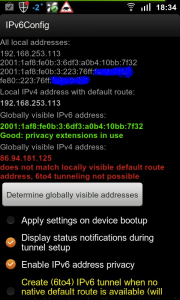An Android (2.3.7) mobile will automatically configure an IPv6 address (SLAAC), when it receives a Route Advertisement (RA) packet. Your mobile device is ready for the next generation Internet, as it is IPv6 ready and enabled by default. One little concern though is that you’re traceable around the globe, because the Privacy Extension is turned off. Traceable means that someone that knows your mobile network address (MAC address), can track you down every time you are IPv6 connected. Without the Privacy Extension (RFC 4941) turned on the last 64 bits of the 128 bits IPv6 address holds your unique mobile network address. Someone to whom you connect regularly (Google, Hotmail, IPv6Security 😉 ) could filter on the last part of the address in log files, and plot where you where.
Thanks to the App IPv6Config (root required) from Rene Meyrhofer, you can turn the Privacy Extension option on. If you care about privacy this may be an app for you.



